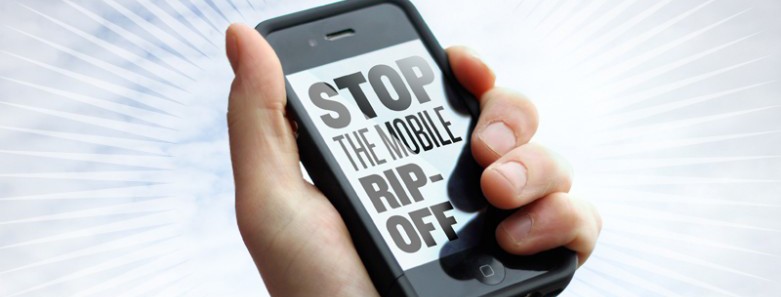
There's No Such Thing as the Tooth Fairy --- or Data Hogs
[UPDATED 3/1/12]: AT&T announced today that it’s changing its throttling policy — it won’t slow down data connections for unlimited users until they hit 3GB of use. Previously, AT&T throttled users once they went over 2GB (see below), which was a cheap way of forcing them into a more expensive “metered” plan. Nevertheless, 3GB is still a far cry from “unlimited.”
Let’s not sugarcoat it: The wireless industry is a big racket.
Here’s one reason why: AT&T and Verizon are slowing down — or throttling — Internet access on smartphones, supposedly to manage congestion on their networks. Yet a new study supports what many of us have been saying all along: These companies aren’t throttling to save bandwidth.
They’re doing it to rip us off.
Last week a report from consumer analysis firm Validas showed that, in spite of the carriers’ claims to the contrary, people with unlimited data plans are not using data at significantly higher rates than those with limited plans. The number of unlimited-plan users is smaller than it used to be because AT&T and Verizon have moved to “metered” pricing for new customers. Yet these remaining unlimited users are seeing their service slowed down after they hit two GBs of use. That’s an odd definition of “unlimited.”
Most wireless companies are following this trend, phasing out unlimited data plans in favor of metered plans that limit your data use to two, three or five gigabytes a month — or even less. For context, streaming just one Netflix video over a mobile connection could push you over the lowest limits.
Validas’ study also shows that unlimited users use about the same amount of data as those with limited plans — giving lie to the notion that those on unlimited plans automatically turn into data hogs.
So throttling only one set of users doesn’t address the congestion problem. Validas sees a bigger reason why the carriers are doing it: to “convert” unlimited users into metered users.
The result is more price gouging of consumers, and even more profits for the wireless companies (AT&T’s profits have more than doubled over the past five years, and Verizon’s have gone up by more than 60 percent).
This isn’t the only way these companies are gouging mobile users. Last year AT&T increased its text-messaging rates to force almost all users into a $20/month plan — for a service that costs the carrier next to nothing. Verizon charges the same rates.
And Verizon is eyeing a complicated deal with a coalition of cable companies — including Comcast — that could give it a giant chunk of spectrum and erase whatever smidgeon of competition currently exists in the wireless market.
The artificially high costs of data and text messages don’t just affect your ability to stream Mission Impossible and text your boyfriend. These ripoffs threaten our very ability to communicate and engage in politics in the 21st century.
The fact is, smartphones are the most personal — and political — devices we own. They’re changing how we communicate and engage in politics. And for many people, iPhones and Androids are the main way to get online. Yet big wireless companies are doing everything they can to stop us from realizing the true potential of mobile devices. AT&T and Verizon slow down data connections, block applications they don’t like, spy on us, try to take out competitors, lock up the best devices in exclusive deals and keep us tied to them with exorbitant early termination fees.
We’ve let the carriers get away with this for far too long.
The future of how we communicate depends on competition and fairness in the wireless marketplace. It’s time to take the carriers to task for their anti-consumer, anti-competitive behavior.
In the coming months we’ll be holding the wireless companies accountable by challenging and blocking their competition-killing deals. The days of charging us more while their profits go up and their costs go down must come to an end.
If preserving consumer-friendly wireless competition is important to you, please consider a donation to the Free Press Action Fund. Thank you.